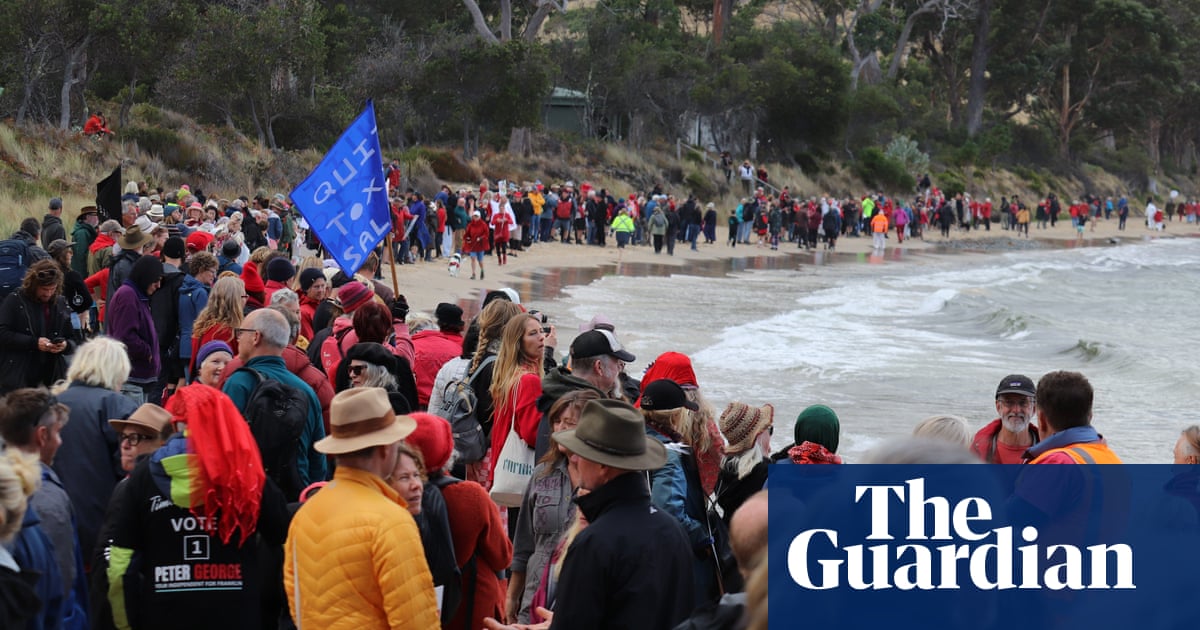In order to protect the Farm of Tasmania Salmon, the ‘worrying’ invoice can stop communities that challenge other projects | Tasmania

The Albanian government can stop communities that challenge other decisions, including a new bill, coal and gas developments to protect Tasmanian salmon farming, and may not be effective even in its main purpose.
The government plans to change the Environmental Protection and Biodiversity Protection (EPBC) Law on whether the expansion of fish cultivation in Macquarie Port in 2012 by Tanya Plibersek, the Minister of Environment, to make a change.
Australia, which analyzes the draft bill to be introduced to the parliament on Tuesday, said that the proposed legislation of the Albanian government would only affect the salmon industry in Macquarie Port, said it was “simply wrong”.
Elizabeth McKinnon, the joint manager and lawyer of the organization, said that the draft bill is not specific or geographically specific, that changes may have wider consequences and can be applied to other decisions, including mining, land cleaning or housing and infrastructure development.
“We are afraid that environmental protections will lead to a large -scale return of environmental protections in federal law,” he said. “These changes in Australia’s national environmental laws may encourage the ability of community and environmental groups to challenge destructive projects from new coal and gas projects to disorganization or salmon farms.”
A separate pre -recommendation to the Australian Institute questioned whether the legislation could do what the government wants, which would not be legal difficulty if the change was applied to salmon farming in the harbor.
Leanne Minshull, the strategy director of the institute, said the government’s change in the law will “create more chaos than clarity”.
“At the last minute, trying to force the laws has never worked in the past and now it will not work,” he said. “We need to look at the salmon industry in accordance with the pressure of an election campaign and politics.”
The re -evaluation of the Macquarie Harbor decision was partially triggered by three environmental groups in 2023 due to concern about the impact of salmon farming on MaUgean Skate, a extinct fish species. Plbersek reviews whether the 2012 decision, which accepts farming, is not a controlled action – that it does not need a complete federal environmental assessment – whether it is true.
If important information about the risk of damaging a protected species or habitat after the decision is made, such investigations may be requested. A view of an environmental department, published in accordance with the Freedom Freedom Laws, argued that while preparing an environmental impact declaration, salmon farming could have to stop in the harbor.
The legislation of the Albanian government will prevent the demands of third parties to re -evaluate in some cases where developments are considered to be “not a controlled action”. In the decisions of the minister, when he states that development requires state or regional supervision or management, it has already been continuing and that it has continued or repeated for at least five years since the decision is made.
EJA said that the lack of a specific place or industrial information in the statements of the bill may mean that the proposed legal changes may be the results of many other projects that are accepted as controlled actions.
“The Albanian government not only moved away from the promise of correcting the broken environmental laws in this country, but now it quietly eliminates the ability of community members to examine harmful projects,” he said.
A government spokesman said the amendment was “this is a very special change to address a defect in the EPBC Law”.
“Existing laws are valid for everything else, including all new offers for coal, gas and land cleaning,” he said.
“Our environmental laws are broken. They do not protect the environment sufficiently or do not make a timely decision to enterprises or protect the workers and communities they live in.”
On Monday, in the midst of the internal angle of pro -environmental deputies, the government said it depends on wider reforms to strengthen environmental protection and accelerate decision -making.
“We will consult with states, business and environmental groups and details in a second semester,” he said.
On Tuesday morning, the Greens said the Senate would ask the Senate to send the bill to an investigation by a Senate Committee. While the government’s bill was expected to receive support from the coalition, it was likely that this movement would fail.
Greens Environment Spokesman Sarah Hanson-Yung, “the government’s legislation running to the environmental laws need to be examined properly,” he said.
“The Senate should be answered blurred legal questions about environmental results before hurrying this legislation.”
Hanson-Youung is done under the cover of the budget, because the Labor Party smells, the law smells, smells of rotten salmon and the whole process smells ”at a joint press conference with environmental groups and independent deputies.
Clark’s independent deputy Andrew Wilkie, which covers Hobart and its surrounding areas, described the movement as one of the most terrible attacks on our environment ”.
Independent Senator David Pocock said that legislation is an example of why voters should consider voting independently in the coming elections.
“[Australians] They value nature and want to see that politicians look at the long term. “




